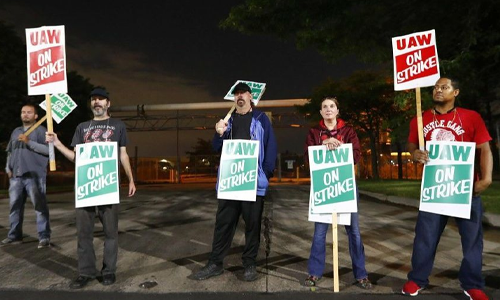Toronto, Ontario — September 16, 2019 — On Sunday night, the United Auto Workers (UAW) union went out on strike against General Motors — marking the first work stoppage in the U.S. auto industry in 12 years.
49,000 GM employees walked out on the job at 11:59 p.m. on Sunday, leaving 53 GM facilities, 33 manufacturing sites and 22 parts distribution warehouses unstaffed. The strike is the largest in the U.S. since 2007, the last time employees walked out on the automaker.
The collective agreement between GM and the union expired on September 14. While there was reportedly progress in recent talks, the union says there are still significant differents between the parties on wages, benefits, temporary employees, job security and profit-sharing. Negotiations continued into Sunday night when the strike deadline came and went.
The union seeks higher hourly wages, lump-sum payments and a better profit-sharing plan. It wants GM to agree to limit the use of temporary workers and give them a clearer path to permanent employment.
GM said it made a substantial offer, with higher pay and profit sharing, along with investment to bring new jobs. It also said it offered to commit to investing US$7 billion in the coming years to preserve up to 5,400 jobs. The company also teased a repurposing plan for two of the four plants currently slated for closure.
In November 2018, the company announced plans shut the Detroit and Lordstown assembly plants, along with transmission plants in Baltimore and Warren, Michigan. The UAW has vowed that keeping the plants open would be a key bargaining demand. GM did not state any firm plans to reopen either plant, but, according to an unidentified source familiar with GM’s offer said it included a promise to build a new electric truck model at the shuttered Detroit plant, and the manufacturing of new batteries for electric vehicles in Lordstown.
While GM Canada employees remain at work, the country may not get off scot-free. Because the auto supply chain is integrated, Canadian plants could potentially experience a parts shortage.
GM uses “just-in-time” delivery, meaning hundreds of parts cross the border every day. If the engines or transmissions built in St. Catharine’s, Ont. are bound for cars assembled in the States, the plant may have to slow or stop operations altogether. Similarly, if Canadian assembly plants are depending on parts from the U.S., operations could be halted. GM Canada has yet to say how soon Canadian plants may be affected, but the parent company insists it will be at least two months before auto dealerships are affected by shortages.
Canadian GM employees are represented by a different union, Unifor. The Canadian union issued a statement on Sunday verifying it “supports the UAW in negotiations for a fair contract settlement with General Motors.”
Negotiations between GM and the UAW resumed at 10 a.m. this morning.





































